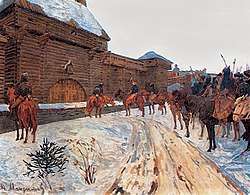Siege of Moscow (1238)
| Mongol invasion of Rus | |||||||
|---|---|---|---|---|---|---|---|
| Part of Part of Mongol conquest of Eastern Europe | |||||||
 Mongols under the walls of Vladimir. | |||||||
| |||||||
| Belligerents | |||||||
| Mongol Empire |
| ||||||
| Commanders and leaders | |||||||
| Batu Khan |
Prince Vladimir Yuryevich (POW) | ||||||
| Strength | |||||||
| At least one tumen(10000) of nomad cavalry | Few hundred militia | ||||||
| Casualties and losses | |||||||
| Light | Heavy, survivors enslaved | ||||||
Siege of Moscow was part of Mongol invasion of Rus.
Prelude
After the destruction of Ryazan on December 21, 1237, Grand PrinceYuri II sent his sons Vsevolod and Vladimir with most of Vladimir-Suzdal army to stop Mongol invaders at Kolomna. There, the Russian army was heavily defeated, and survivors scattered and fled North, to Vladimir and Moscow.
Siege
After destruction of Kolomna in January 1238, Prince Vladimir, younger son of Yuri II of Vladimir, fled to Moscow with a small force of survivors.[1] "And the men of Moscow ran away having seen nothing",[2] according to The Chronicle of Novgorod. At the time Moscow was but a fortified village, a trading post "on a crossroads of four rivers".[3] The small, wooden fort was taken after five days of siege.
Aftermath
Prince Vladimir was captured and executed two weeks later, before the eyes of the defenders of Vladimir.[4]
References
- ↑ "Никифоровская летопись. Никифорівський літопис. Том 35. Литовсько-білоруські літописи". litopys.org.ua. Retrieved 2018-02-25.
- ↑ Michell, Robert; Shakhmaton, A. A.; Forbes, Nevill; Beazley, C. Raymond (Charles Raymond) (1914). The chronicle of Novgorod, 1016-1471. University of California Libraries. London, Offices of the society.
- ↑ Grigorjevič., Jan, Vasilij (1991). Batu-kan : istorijski roman. Lobačev, Đorđe., BIGZ). Beograd: Prosveta. ISBN 8607005944. OCLC 438360055.
- ↑ "Новгородская летопись". krotov.info. Retrieved 2018-02-25.